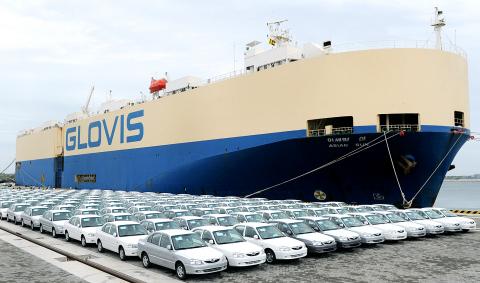Sri Lanka’s first Chinese-built port, a strong symbol of Beijing’s investment in South Asia, opened for international shipping yesterday with the handling of 1,000 cars from India.
The US$1.5 billion deep-sea port in southern Hambantota, the home constituency of Sri Lankan President Mahinda Rajapakse, straddles a major east-west shipping lane used by 200 to 300 international vessels daily.
The idea of the project, which was delayed by just over a year, is to create a new logistics hub to handle trans-shipments from the Asian region and provide a boost to Sri Lanka’s economy as it recovers from decades of civil war.

Photo: AFP
Regional power India turned down the offer to construct the deep-sea port, saying it was not commercially viable, but China’s presence created unease in New Delhi, which views Sri Lanka as being firmly in its sphere of influence.
China has since agreed to build a second port in Colombo and Chinese firms have pledged investments amounting to US$50 billion spread over the next 10 to 15 years, according to Sri Lanka’s trade ministry.
Elsewhere in South Asia, China has funded port facilities in Pakistan, a long-standing ally, and has plans for rail projects in Nepal, a traditionally India-aligned country where Beijing is increasingly influential.
Bangladesh has asked for Chinese help to build a port and Beijing recently opened an embassy for the first time in the Maldives.
According to Charu Lata Hogg, an analyst at Chatham House, a London-based think tank, India has come to terms with China in its backyard.
“There seems to be a tacit understanding that their commercial interests can be complementary,” Hogg said. “Indian cars going through a Chinese-built port in Sri Lanka reveals a lot about this relationship.”
The first shipment of cars yesterday in Hambantota, 240km south of Colombo, came from the south Indian port of Chennai and is destined for Algeria.

Taiwanese Olympic badminton men’s doubles gold medalist Wang Chi-lin (王齊麟) and his new partner, Chiu Hsiang-chieh (邱相榤), clinched the men’s doubles title at the Yonex Taipei Open yesterday, becoming the second Taiwanese team to win a title in the tournament. Ranked 19th in the world, the Taiwanese duo defeated Kang Min-hyuk and Ki Dong-ju of South Korea 21-18, 21-15 in a pulsating 43-minute final to clinch their first doubles title after teaming up last year. Wang, the men’s doubles gold medalist at the 2020 and 2024 Olympics, partnered with Chiu in August last year after the retirement of his teammate Lee Yang

FALSE DOCUMENTS? Actor William Liao said he was ‘voluntarily cooperating’ with police after a suspect was accused of helping to produce false medical certificates Police yesterday questioned at least six entertainers amid allegations of evasion of compulsory military service, with Lee Chuan (李銓), a member of boy band Choc7 (超克7), and actor Daniel Chen (陳大天) among those summoned. The New Taipei City District Prosecutors’ Office in January launched an investigation into a group that was allegedly helping men dodge compulsory military service using falsified medical documents. Actor Darren Wang (王大陸) has been accused of being one of the group’s clients. As the investigation expanded, investigators at New Taipei City’s Yonghe Precinct said that other entertainers commissioned the group to obtain false documents. The main suspect, a man surnamed

The government is considering polices to increase rental subsidies for people living in social housing who get married and have children, Premier Cho Jung-tai (卓榮泰) said yesterday. During an interview with the Plain Law Movement (法律白話文) podcast, Cho said that housing prices cannot be brought down overnight without affecting banks and mortgages. Therefore, the government is focusing on providing more aid for young people by taking 3 to 5 percent of urban renewal projects and zone expropriations and using that land for social housing, he said. Single people living in social housing who get married and become parents could obtain 50 percent more

DEMOGRAPHICS: Robotics is the most promising answer to looming labor woes, the long-term care system and national contingency response, an official said Taiwan is to launch a five-year plan to boost the robotics industry in a bid to address labor shortages stemming from a declining and aging population, the Executive Yuan said yesterday. The government approved the initiative, dubbed the Smart Robotics Industry Promotion Plan, via executive order, senior officials told a post-Cabinet meeting news conference in Taipei. Taiwan’s population decline would strain the economy and the nation’s ability to care for vulnerable and elderly people, said Peter Hong (洪樂文), who heads the National Science and Technology Council’s (NSTC) Department of Engineering and Technologies. Projections show that the proportion of Taiwanese 65 or older would